I have made one hundred visits to the Newtown Gym on the current annual membership, which continues to late September. Three or so days a week after walking the dog around the park I head for the gym, while Kate takes the mutt home.
 I cannot vouch for either the 4 a.m. start or the midnight finish.
I cannot vouch for either the 4 a.m. start or the midnight finish.
A visit to the gym consists of twenty-five minutes on one of the stationary bicycles or the upper torso whirly-gig. There follow stretches of the calf and thigh. Then comes a test of some of the metals to see if they are still heavy. The weights will includes both leg and upper body.
When pressed for time I omit some, or all of the weights.
The gym routine involves a uniform of sweat pants and shirt with a red jacket, pockets stuffed with reading matter, water bottle, sun glasses for the walk to and from, cleaning cloth for the glasses, earphones, and a neck pouch for the iPhone and notebook. That is in addition to the house keys and wallet in the sweat pants pockets, along with the magic fob to enter the gym. Locked and loaded.
I read on the bikes and listen to podcasts on the upper torso machines, hence the earphones. If possible I use a device near a window to watch the world go by on King or Wilson Streets. The first choice is listening is ‘In Our Time’ with Lord Bragg from BBC4, followed by ‘The Writer’s Almanac’ with Garrison Keillor, and ‘Grammar Girl’ with Mignon Fogarty. Choices two and three come into play when his Lordship goes on vacation.
I keep notes on what I do at the gym, so as to vary the exercises from one visit to another, in the notebook. It is partly encoded, since I am the only reader.

Usually the routine is finished about 9 am. At home a star goes on the calendar date of each gym visit, as per daughter Julie’s instructions.

Here I am après le gym on the way to Best and Brightest last week.
‘Brazzaville Beach’ (1990) by William Boyd
A very unusual locale and set-up for a krimi. Bravo!
The action centers on a research station in the forests along the Congo River where a multinational group of scientists observe chimpanzees sometime in the 1960s. The narrator is a recently-minted PhD who muses on what led her to this place when she is not watching the monkeys. (I do so detest backstories because they are distracting.)
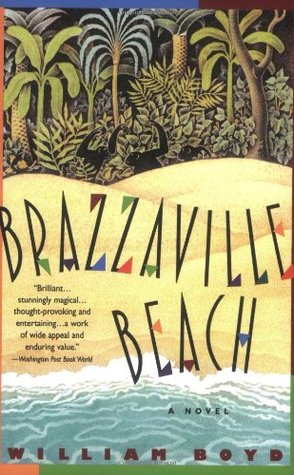
The book offers intriguing soupçons about the primatological research into the social customs, practices, and habits of a clan of chimpanzees, along with a study of their diet, and movements, including bowels.
In the distance, on the far side of a mountain range there is a four-way civil (tribal) war going on, and that spectre cannot be ignored, since it might influence the funding agencies to withdraw support. Of course, there are twists and turns among the scientist, though our protagonist is so junior, she seldom sees the professional rivalries firsthand. That is, she is out in the field observing, while back in the base camp the more senior members of the party wrangle over precedence. What she sees there in the field is remarkable and in time upsets the established order.
Spoiler alert.
The book recounts three intersecting conflicts: there is war among the chimpanzees, there is conflict among the scientists over the data and its interpretation, and the tribal war mentioned above. In time, the three come together. It is all very ambitious. The first two provided more than enough material, and this reader found the intrusion of the third inevitable and unnecessary.
The most interesting aspect is the primatology. The manners and morēs of the chimpanzees in the wild, the relations among them, including the conflict that is a war in all but name. But also of interest is the relationships of the primatology observers with the chimpanzees. The scientists personify the chimpanzees with nicknames, though technically they have specimen numbers, these latter are only used in the final write-ups. Nor is there any doubt that the chimpanzees recognise and distinguish the observers from themselves and that they know one observer from another, and there is one harrowing moment when that recognition is crucial.
Years ago as a prospective text for the Power course, I read Frans de Waal’s ‘Chimpanzee Politics’ (1985), a study of chimpanzees in the Arnham Zoo in the Netherlands, a book that is written with panache and insight, along with a few gratuitous reference to Machiavelli that I logged in my collection of inanities about him. While de Waal’s book has much technical detail about quasi-experimental tests done in captivity, it is easy enough for a general reader, and leaves one in no doubt of the intelligence and capacity to learn of chimpanzees.

Our heroine survives it all but some others (including some of the chimpanzees) do not. She finds that among the tribal warriors are some decent folks, that the mercenaries attracted to the conflict are a varied lot, that some of the scientists on the project are unscrupulous and mercenary themselves (really?), that the chimpanzees are capable of moral acts, that her husband’s suicide which more or less drove her to Africa remains a mystery, and that…. the most important lesson, life goes on even in Brazzaville Beach.
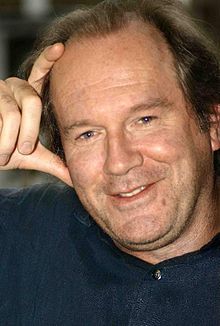 William Boyd
William Boyd
The writing is assured; the touch is light; the themes are serious as they slowly emerge. The context is richly detailed. Altogether a good book. William Boyd has others and I might read another one day but I will not make it a priority, because I thought this one had too many themes and circumstances competing for my thin attention. Once again, I seem to be in a minority because the back cover is plastered with testimonials from the highest sources like the ’New York Times.’
The title caught my eye because Brazzaville in the Republic of the Congo was where Charles De Gaulle made his second radio broadcast, this one to the French colonies. There was a large transmitter in Brazzaville, built in the 1930s to reach the African colonies and even some air and naval traffic. De Gaulle traveled there in 1940 to win supporters, and met with some success.
‘The Spinoza Problem: a Novel’ ( 2012) by Irvin Yalom
The setting in 17th Century Amsterdam shows assiduous research and the differentiation of characters is good, as far as I can tell. On that qualification there will be more later.

Baruch Spinoza (1632-1677) repays effort. The first is with his name. He was born Benedito de Espinosa of Portuguese parents who had moved overnight to Amsterdam to avoid the convert-or-die (later) Iberian Inquisition. (Why does Ted Cruz come to mind?) The parenthetical reference ‘later’ applies because even Jews who willingly converted to Catholicism were subjected to subsequent persecution. In Holland he was sometimes styled Benedict. In all those permutations his first name means ‘Blessed.’

That qualification ‘as far I can tell’ means I stopped reading the book very early. I violate my rule of the positive in this case because I wanted to express my admiration for Spinoza the thinker. In addition his reputation as a man has come down the ages as a simple, unpretentious person, whose life was a model of rectitude, in contrast to the wastrel Jean-Jacques Rousseau, the gloom-and-doom merchant Thomas Hobbes, the obnoxious self-promoter John Locke, or the nutter John Stuart Mill.
Spinoza’s two tracts, the ‘Politics’ and the ‘Ethics’ are fine books, though arid. He much admired the method of geometric reasoning. Yet somehow he is not on the starting team in the Tour of Political Theory, so I only ever managed to slip the ‘Politics’ onto the syllabus once many years ago. Ditto his fellow Dutchman Hugo de Grotius.
‘The Spinoza Problem: a Novel’ is described as a thriller, and I should have stopped there. The lure of Spinoza was, however, too much; I bought it and started to read. The book has two characteristics that I dislike so much that I gave up on Spinoza.
First, everything is written in the present tense, including flashbacks. Ergo everything is happening at once.
Second, this simultaneous action occurs across the centuries because every other chapter alternates from Spinoza’s time in the 17th Century and the 20th Century. I like my krimis linear and literal.
The early scene with the schoolboy Alfred Rosenberg (look him up, if he is unknown) getting a lesson in life at his Estonia high school is certainly interesting, and sheds some light on anti-Semitism. I wish I had been able to persist,,,, (However, there are so many other, good books that do not set my teeth on edge.)
The use of the present tense is so common I suspect it is advised by agents and perhaps required by publishers, at least, of certain genres. That is, the thriller. Why do I react to it?
When everything is happening at once, it is left to the reader to sort out sequence, to distinguish past from present, and to supply the emphasis and the pace of events, and even to supply the viewpoint. It is like looking at two-dimensional flat world without topography and without time. See, it is lazy writing making the reader do the work that the writer should have done. Stephen King would have a zinger on this. Verb tenses are tools, and should be put to work. That is why they exist.
Not everyone is bothered by ahistorical simultaneity, it seems, because the book is published by a major New York publisher and has a good rating on Good Reads, for whatever that is worth. (I never cease to marvel at the illiterate accolades heaped on some dreadful specimens. Why did Donald Trump come to mind?)
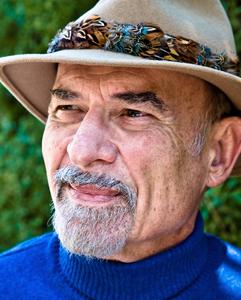 Irvin Yalom
Irvin Yalom
Confession: I was also irked by a lengthy introduction from the author about his many and deep interests. If that has to be present, put it at the back. In any event, I skipped it, something I was taught to do in college literature classes so as to make up my own mind. That I did.
‘Lanterne Rouge’ (2013 ) by Max Leonard
Lanterne Rouge? Yes, it can be the red light on the last car in railway train, in the dark there to let yardmen, roustabouts, and switchers know that is the final car. It can indicate a doctor’s late night surgery in some countries, and…., well, you know. (I only know from movies.)
In this case, none of the above!
The Lanterne Rouge is the last rider to finish the Tour de France, and Max Leonard, himself a cyclist, wondered how those losers felt about being last.

I am glad he did, because their lives, races, and attitudes are varied, intriguing, and represent much of the Tour de France at its best and at its worst. Moreover, Leonard has a light touch with self-deprecating humour, as he rides them down.

Perhaps the most important point made is that to finish last in the Tour de France is not losing!

Counter-intuitive, but true all the same.
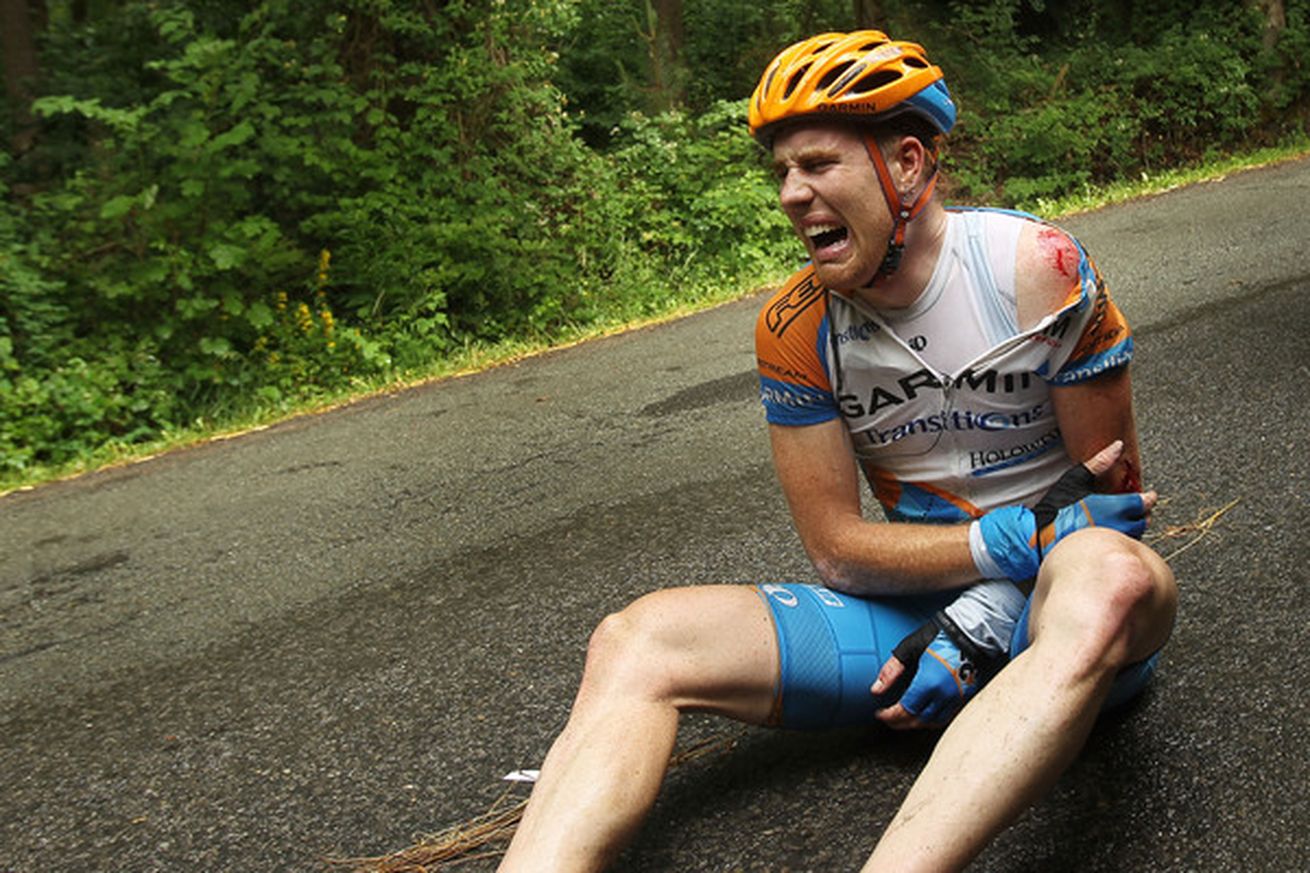
When one Spanish rider was asked by a boneheaded journalist, is there any other kind, how he felt about finishing last, this was his reply: ‘One hundred and ninety-eight riders from the cream of world cycling started the Tour and I finished (stress, finished) at 120.’
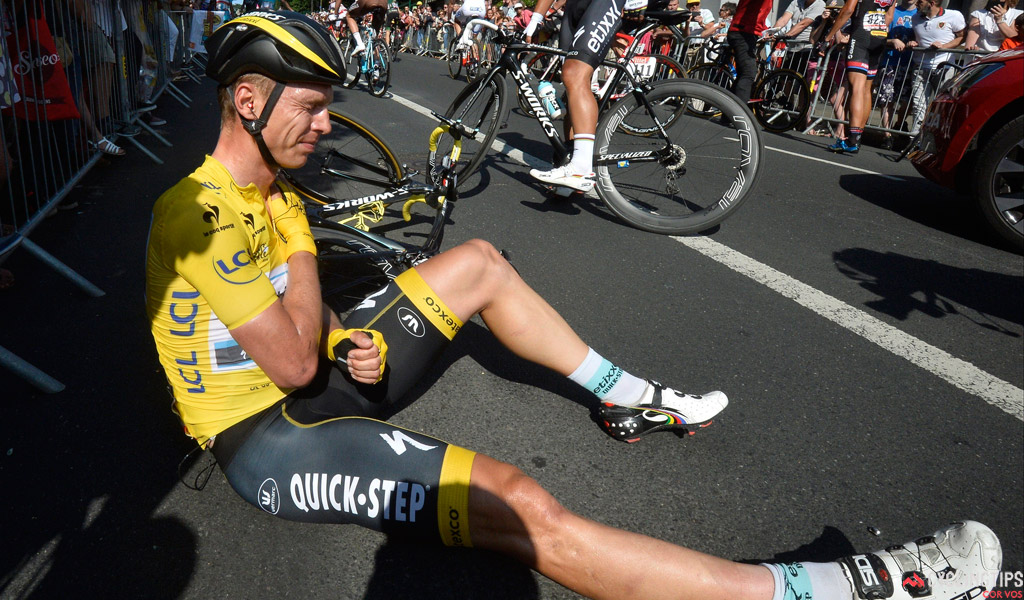
Explanation: Seventy-eight others did not finish, but he did. To do so he had to make the time cutoff each day to stay in the race, not easy that, period. He coped with mechanical breakdowns and stayed in the race. He managed injuries from falls and stayed in the race. All the while he performed his role on the team, carrying water bottles for others and pacing the sprinter. He climbed the mountains in the Pyrenees and the Alps, endured the individual and team time trials, pedalled the long flats, and coped with the weather. Hard. Hard. Hard.
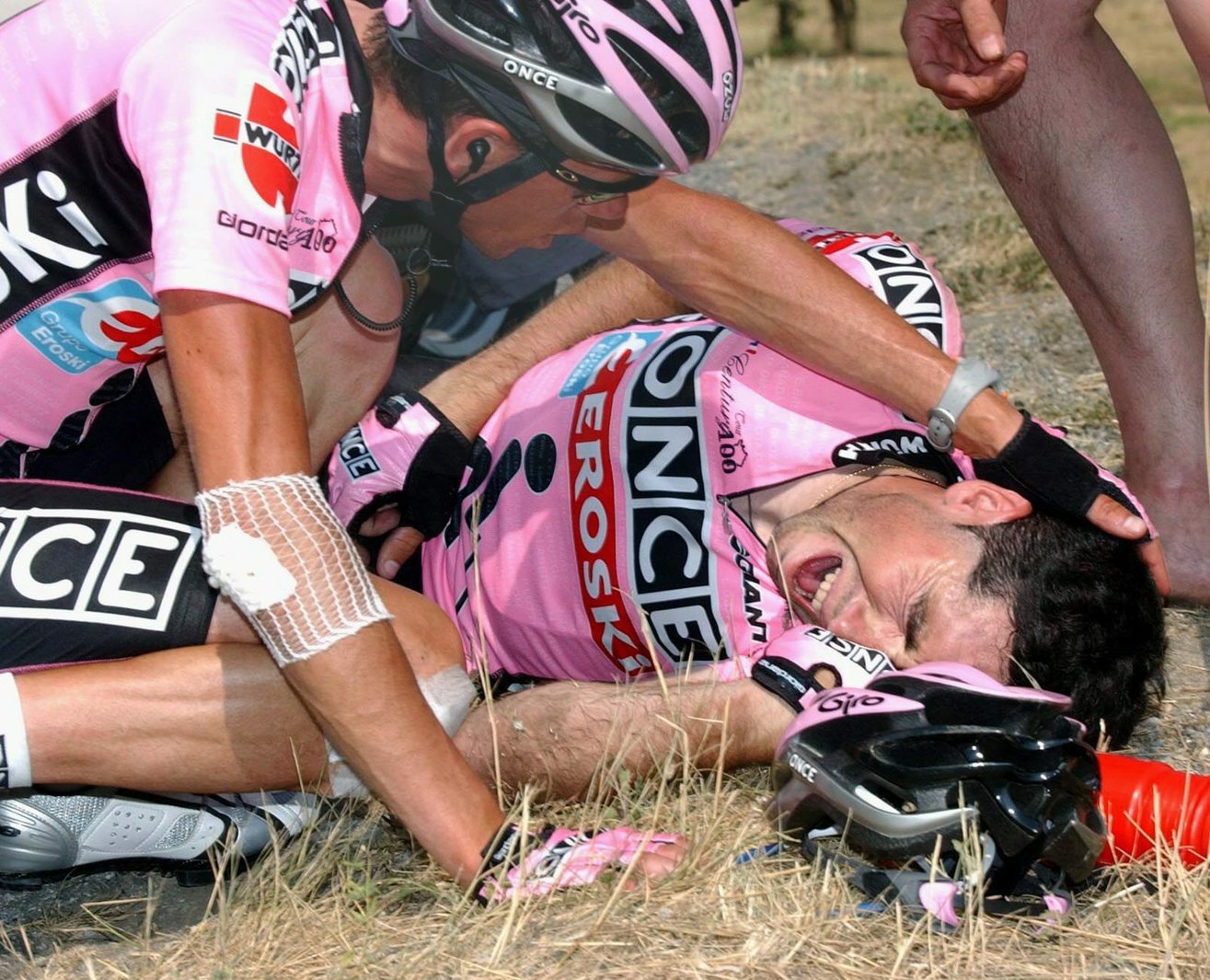
It is a theme that recurs. Finishing is itself a triumph, over the elements, over the odds, and over one’s own weakness, capped by a roll down the Champs Elysee with family and friends on the sidelines among the 100,000 spectators and millions more on television!
Sometimes it is a triumph over injury, as one Lanterne Rouge rode the last eight days in a neck brace, others with enough stitches to bring tears to one’s eyes. All of them overcame the inner voice that urged them to quit on the slope of L’Alpe d’Huez, half-way through a 60-kilometer time trial, while riding last through a parallel rain storm off the Atlantic, or on a hairpin-turn descent. For many it was the dream of lifetime fulfilled to ride in the Tour and to finish. Period.
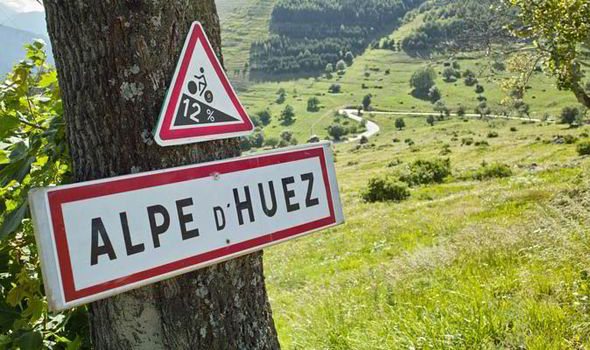
Further proof, be it needed, is in the person of Jack Durand, who finished last and yet stood on the winner’s podium on the Champs Elysee! Huh? He was awarded the medal for the Most Competitive Rider.
Through the three weeks of the Tour he led one attack after another, on climbs, in the flat, against the wind, through tunnels, often alone. On some days he led the field for a 50 kilometres. Some of breakaways produced a gap of 12 minutes. Some days he pedalled quietly in the peloton. He was unpredictable and explosive. His post mortem was this: ‘Everyday I ride to win. Against such champions as gathered for this race, I have to beat them mentally with breakaways.’ Indeed he did win a stage in that tour.
Then there is Phillipe Gaumont who became a (barely) riding chemistry laboratory. He surrendered to Dr Alchemy, and rode on Belgian Pot, a concoction of cocaine, blood stimulants, and anything else lying around the laboratory. As he slowed down, he took more needles, the syringes taped to his ankles inside his socks. The effect was curvilinear, at first he was stronger, then he plateaued, and then he slowed, as he slowed, he shot up ever more drugs in the hope of regaining speed, but instead that slowed him down even more and he could barely finish. Thereafter he broke down, and shortly thereafter told all in a memoir. He died at 44, surely the chemical soup hastened the end.
 Max Leonard
Max Leonard
These stories illustrate the material. In its one hundred editions, there has always been a Lanterne Rouge, and there are more of their stories in the book. There are many ways to be a lantern rouge in life and it does not mean being a loser. There is a moral in there somewhere.
‘Entanglement’ (2010 ) by Zygmunt Miloszewski
This in a police procedural in a series following the investigations of Polish State Prosecutor Teo Szacki. In Poland, according to this novel, the prosecutor does the investigating, and not the police whose domain includes the heavy lifting and car chasing. The locale is Warsaw with its nouveau riche and old communists side by side. It is part of series.
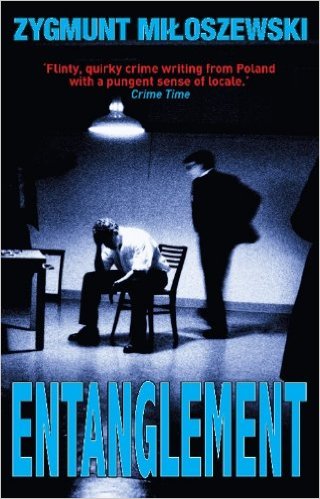
A middle aged man in mid-career is found dead in a church, a shish-kabob skewer stuck through his eye. He was participating in a role-playing therapy group using rooms in the church. Between sessions he was murdered. Did someone take the role playing too seriously! Was there an intruder? Did the victim have an enemy who followed him there? Did he — somehow — commit suicide with that skewer?
Most of the role-playing was videoed and much of the early going is Szacki watching it with the therapist who explains the proceedings, while more than once, Szacki thinks about his own life and his own need for…something, perhaps even therapy. The theoretical explanation of the procedure seems incredible [no spoiler] but it hangs together (and adds to the mystery, which is often lacking in krimis.) In addition, the victim also recorded some of his musings on a pocket recorder, and these, when discovered, add to the incredibility of it all, because he seems at one point to be talking to a ghost.
The more Szacki digs, the more confusing and paranormal it seems to become. This mystery is not welcome to a man who lives on and for facts.
Warsaw is new to me and I enjoyed the to’ing and fro’ing around the city in the summer rain. The banter between colleagues in the prosecutor’s office, the lack of a budget for even basic tests, the vulture journalists looking for blood, the boom-and-bust all at once nature of contemporary Poland while the rich get richer and the poor get poorer, and the role-playing therapy, these are all well handled and add layers to the narrative texture.
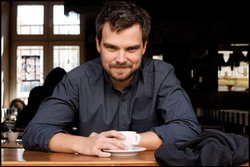 Zygmunt Miloszewski
Zygmunt Miloszewski
There is a plot wobble for this reader. Szacki seeks a second professional opinion on the therapy session and that confirms the procedure, but later…. Well, no spoiler but the curve disappointed this reader.
While the author distinguishes the characters, as always with such unfamiliar names, I found keeping the names and the individuals straight difficult. Though I consumed those dark, depressing, and dispiriting Russian novels that were de rigueur in college, I could never keep the names straight then either.
The translation and presentation on the Kindle are good. The production is far better than for the other Polish krimi I recently discussed, ‘Polychrome.’
Brexit
Bexit? Sure, why not? It is bound to be the solution to all problems, since none are homemade in Britain. rright?

Here is one prophecy.
The United Kingdom leaves the European Union.
Thereafter Scotland achieves sovereignty and leaves the United Kingdom to join the European Union.
Not to be left behind, Wales does the same.
Northern Ireland? Surely it would be next.

The result will be Little England.
But not for long, because the rustbelt in the north will consider seceding, so as to join the European Union.

It will then be Littler England. And a new flag will have to be designed.
Why context counts. Edward T. Hall, ‘Beyond Culture’ (1976)
The distinction between High and Low Context is a valuable tool. It can be applied at many levels to social interactions. I fastened on to this distinction because it explains much about the writings of Niccolò Machiavelli. He was a high context writer. That is one reason why I bristle when I see his themes applied to … well almost anything since his death.
To illustrate in broad, within a nuclear family speech is often cryptic, because both speaker and auditor are entwined in the same context which itself communicates much through the accumulation of experience.

When Kate says, ‘It’s Thursday,’ I know she means it is time to put the wheeled bins of recycling and rubbish on the street to be emptied early on Friday morning. She does have to say, ‘It is time to wheel out of the garage the red-lidded and yellow-lidded bins, one at a time, because it is tight squeeze past the car, to the front of the house near the curb facing backward for the mechanical arm to lift onto the bracket on the truck…..’ Her shorthand is very clear to me, but has been incomprehensible to house guests.
Some years ago we prepared a manual for house-sitters who move in while we travel, and in writing and illustrating that manual we assumed low context, and explained and spelled everything out from the location of spare light bulbs, to the vagaries of Wi-Fi, to the operation of the garage door, the use of Netflix, the way the lock works on the back gate, to the nights when the bins have to go out, and so on and on. The manual will soon be a multi-volume work because, lacking context, it is explicit and detailed about everything.
For those still not convinced that context matters, consider the array of remoters that lie around the tele, video, and music devices at home. Their use and interaction has been learned by users, but is far from obvious to a neophyte. While I can operate our system, barely, there is no chance I can do so with someone else’s without guidance, instruction, or a manual.
More generally, in the state of Nebraska everyone is a Huskers football fan, most volunteers, some conscripted, and every Sunday with friends and family, and every Monday with colleagues, there is a postmortem of each Saturday’s game in the season. It may start with a remark like, ‘Thomson has got one powerful arm.’ The auditor is assumed to know whom Thomson is, what the reference is to, perhaps a sixty yard Hail Mary touchdown pass in the waning moments of the game, and more. Nebraskans will forgive outsiders for not knowing all of this context, but for one of their own not to know, worse, not to care, is beyond the pale.
This distinction between high and low context explains a lot about the natives described in Colin Turnbull’s ‘The Forest People’ (1961), one of the most fascinating books I have ever read. But when I read it, I did have this tool in mind. This is a book some may remember from the ‘Power’ course in days of yore. Time to read it again.
I see the same distinction between assumed context in philosophers. Some wrote for a wide audience and spelt out first principles, like Plato or John Locke. Others wrote for a known and limited audience and were cryptic like Georg Hegel writing text notes for his students. Others wrote for and to themselves, like Niccolò Machiavelli. Hegel and Machiavelli, in particular, are high context writers, while Locke and Plato are low context.
The chapter on this distinction is about ten pages long, and is to be found in the middle of this book. For me it is the most valuable part.
Much of the rest is punctuated with Hall’s asides on his personal experiences, his previous research projects, and even hearsay. Some may find these touches humane and interesting but this reader found them self-indulgent and padded. Hall is an anthropologist.
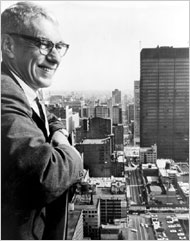 Edward T. Hall in 1966
Edward T. Hall in 1966
Irony is never far away is it, Mr Spock? The author is a sensitive canary to the vibrations of all manner of cultures, remember those personal experiences, but he writes only of ‘man’ and ‘men.’ Even in 1976 that would have caught the eye.
‘The Steel Master’ (1971) by Geoffrey Blainey.
Who was the Steel Master? That is today’s topic, Bleaders. Any one know? No one know?
Essington Lewis, he was the Steel Master. Huh? Never heard of him?
That is the typical response I get from the dog walkers in the park, my research sample of opportunity, as they say in the learned journals of social science. In those pages it usually means captive students in a class. My captives are tethered to pooches, mutts, and hounds.
Every Australian should know Essington Lewis (1881-1961). For extra credit Bleaders, consult Professor Google or Dr Wikipedia on the subject, and report back. Better still, consult the Australian Dictionary of Biography.

Lewis twice refused a knighthood from prime ministers Robert Menzies, Liberal, and John Curtin, Labor, because of the attendant publicity. His phasing was colourful and not suited to a family blog like this.
In time he became a member of the Order of the Companion of Honour, an award so rare few royalist have heard of it and start reaching for thistles and garters to fathom it. It is well above both undergarments and weeds.
At the time Lewis accepted it there were only five other Australian incumbents,and his adhesion was made possible by the direct intervention of King of England. C.H., as it is styled among monarchist, is a club open only to long serving prime ministers. That single criterion excluded Lewis. It is an award so discreet, it escapes, like so much else, the notice of the ever vigilant press.
He was BHP for a generation.
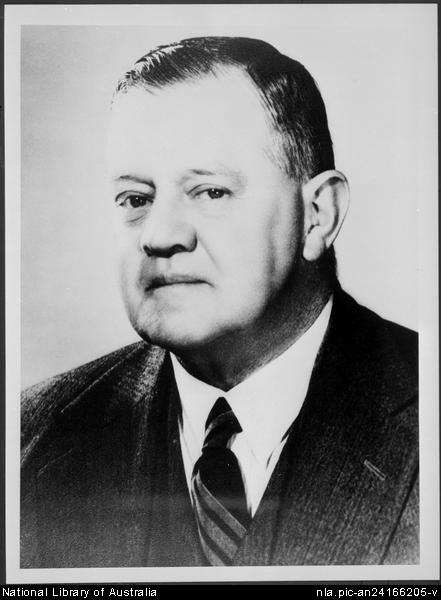 Essington Lewis
Essington Lewis
There was a time, and not so long ago, when every Australian knew that BHP was the Big Australian. BHP stands for Broken Hill Proprietary which began in silver and lead mining and converted itself, in good part thanks to a young Essington Lewis, from the declining silver mines of South Australia to steel manufacturings in Newcastle on the Hunter River, near all that coal for firing the smelter.
Lewis was born and bred in South Australia, educated in the Adelaide Mining School, apprenticed to a BHP property when it was one of hundreds of small mines in the northern reaches of South Australia where the sand blows from the Northern Territory and the far west of New South Wales.
His father, a stock trader, declined not once, not twice, but three times to invest in the nascent BHP enterprise, who bred in his son a vigorous outdoor life, and an outlook on life that prized the outward, the physical, the material, control, and order. Kind of a Teddy Roosevelt without the books and reading glasses. Nor does religion seem to have figured in his life.
Essington was also a demon for detail, and no demon could hide from him in the details. He copied out passages from textbooks and carried them with long into his career, as ready references. He had his clothes altered to accommodate the notebooks he carried to record, it seems, nearly everything he saw and did. He usually had at least two notebooks on his person and he cross-referenced them one to another every night. Each was filled with his minute but legible hand writing, as he recorded, measured, weighed, calculated, hefted, and walked the properties on which he worked. In later life, he also recorded the names and work of everyone he meant on his many tours.
Here is one example from this early days. At the mine the teamsters would tell him how much chaff each horse consumed a day to do its work at a mine, and Lewis would note it, and multiple the cost, but he would also rise at 4 a.m. and feed the animals himself for a week to double-check it. In so doing, without changing the diet for the horses, he hit upon a more efficient way to distribute the chaff and instituted it. This is one of hundreds of examples of his attention to detail.
His strength was in assessing and evaluating, not in innovating, inventing, or developing. He worked his way up from school-boy apprentice to become managing director of the Big Australia when he was thirty-nine, passing over at least three others, each twenty years his senior. For their parts, each accepted his elevation with good grace.
Even before sitting in the big chair, he saved BHP from a blunder. The outgoing managing director had committed to a certain type of steel operation at Newcastle and had began buying equipment for it from the England and the United States. Lewis, though he needed the good will of the outgoing managing director to be promoted as his successor, argued against this kind of operation on technical grounds, and that first slowed and then stalled the implementation of it. Lewis was right, vindicated in examples of other steel operations that had used that method with bad results. Despite this clash, because Lewis’s arguments were based on technical facts, and at no time did he engage in any personal rivalry, come the time, the outgoing managing director recommended him.
Lewis would not have hesitated one instant in opposing the boss’s decision. Technical considerations were the only considerations. He would not even have thought of keeping quiet to gain the promotion.
In person he was blunt and direct. He did not ‘suggest’ or ‘recommend,’ or ask for something ‘to be considered.’ He just said it. While on the factory floor this manner was coin, the higher he rose in the company, the politer the society with which he mixed, the more this bluntness annoyed, riled, and irritated many with who came into contact with him. He himself did not seek anyone’s society, and shrank from publicity of any kind. Unlike the Skases, Edelmans, Bonds, and Palmers of recent fame in Australian business, his picture was never to be seen in the press.
BHP went from a small hole in the ground to the Big Australia in part because of fortunate circumstances. Just as BHP was selling off its silver and lead interests to move into steel World War I led to a global demand for steel. Just as BHP was recovering from the post-war slump in steel demand, the automobile renewed the demand.
As managing director Lewis stressed education in his workforce and he sent the senior employees on study tours around the world every five years. He did so himself, as well, partly to learn the latest in steel technology but also to lure investors to Australia to consume the steel BHP made. The emphasis was always on the technical, improving what is already done. By contrast, he would not invest a single solitary shilling in research. Research to his mind, was just speculation. Let someone else pay for that.
This was an attitude about research that seeped into Australian industry, confirmed by the success of BHP. It also explains many of BHP’s subsequent misfortunes, and the like misfortunes of Australian industries in general.
Before becoming managing director, Lewis had his first trip out of South Australia to Newcastle on the Hunter River to look at the steel works site, and then around the world to examine steel production. This trip exceeds even Alexis de Tocqueville’s study tour for its depth and intensity. Lewis filled one notebook after another with observations from the cauldron of a smelter to a rolling plant to a board room across the United States and back, and then onto Europe. In time he shipped back to Melbourne, where he took up residence, several steamer trunks of notebooks, plans, technical drawings, copies of reports, extracts from assays, most in his own hand writing. The notebooks record the names of 1,700 people he met on the tour. All of his subsequent trips were like that.
He had married in his twenties and his wife and their subsequent children do not figure much in this telling. She was frail, and had a tuberculous, the disease that killed their second child. She devoted herself to good works in and around Melbourne.
Curiously, neither Federation nor World War I had much impact on Lewis. There is nary a word about the former in these pages. Nor the Boer War for that matter. Two of his brothers went into the army, and he thought about it, but was dissuaded because of the importance of the war work BHP was doing in the manufacture of ammunition. That much is said, but as seems to have been characteristic of the man, he did not think twice about it. The many hundreds of letters that remain, offer no insight into his thoughts. Invariably, the biographer has it, they describe events and actions. There are no ruminations to be found, and no confidences shared.
But World War II was his finest hour. He became director of munitions and then aviation production. By late 1944 he was managing director of three firms: defence industries employing 144,000 (many of them women), aviation production employing 50,000, and BHP itself employing 20,000. He worked eighteen hour days and took no salary, nor did any of the dozen or so BHP employees he took with him into his defence work. The Owen Gun that played so major a role on the Kokada Trail came from Lewis at the Kembla Plant. The Beaufort bombers that harried Japanese shipping in the Timor Sea came from the BHP plant at Fisherman’s Bend. When Holden could not figure out how to make tanks, Lewis took the assignment into his own hands and turned them out in anticipation of a Japanese landing.
He conducted his war work in Melbourne boardrooms where he cajoled, bribed, and bullied other industrialists to match his personal efforts and those of BHP. He also toured war industries throughout Australia on exhausting missions where he went to the factory floors to study the processes, as always looking for improvements, and talked to machine operators, storemen, women on the assembly line, and even, on one notable occasion, the janitor about what he found when sweeping out the place. In all of this he brought improvements to many facets of Australian manufacturing and business well beyond BHP.
This attention to detail is a great strength, and a great weakness.
But, I should have said earlier, he had insight into the bigger picture sometimes. On a 1936 study tour he went through Japan, where he was treated with exquisite courtesy, while being denied access to anything of substance. He wrote to a colleague that he found the courtesy aggressive and confining. When he returned, his petitioned politicians across the spectrum to prepare for war with Japan. He had concluded Japan was to be an aggressor.
Fearing to arouse Japanese attention, ‘maybe they won’t notice us if we keep our mouths shut’ was the key to Australian foreign policy, and that meant his arguments fell on deaf ears in Canberra. But he believed what he said and begin by fiat to put BHP on a war footing. He caused the Big Australian to tool up for the production of weapons, warships, and airplanes years before the war. When the war started in September 1939 BHP has an air fleet of dozen planes it had made itself which he donated to the Royal Australian Air Force.
In death his aversion to publicity continues. While the massive War Memorial (museum) in Canberra pays homage to every aspect of the home front of World War II, aboriginal patrols, land army, sock sewing, industrial production, Beauforts, Owen guns, nowhere is his name mentioned that I could find on a 2016 visit.
While the National Portrait Gallery online catalogue lists an oil portrait done of him after the war, when we visited in April 2016, it was in storage. The only surprising thing about that was that the guide we asked recognised the name, but was more interested in telling me about the painter, not the subject. Yes, I know galleries and museums have oodles of stuff they do not, cannot display. So Essington Lewis is in a warehouse in Fyshwick, and merchant princes like Jones and Coles are featured in the gallery, along with a self-portrait of man who painted Lewis. Figure out the priorities there.
Once up a time I had heard something about Essington Lewis, and so, unlike many others, I knew who he was. What I had heard was linked to a play (‘I am work’) must have had a lot of publicity because I remembered it, though I never saw it. I even wondered if it had been a radio serial on the ABC, but cannot verify that. Indeed, even tracking down the play proved to be pursuing an untamed ornithoid, as Mr. Data said in ‘The Last Outpost.’ But thanks to a friend I have now it in my Amazon basket. The irony is that the seller is in upstate New York and does not mail to Australia. Plan B it is.
This is a lobby poster.
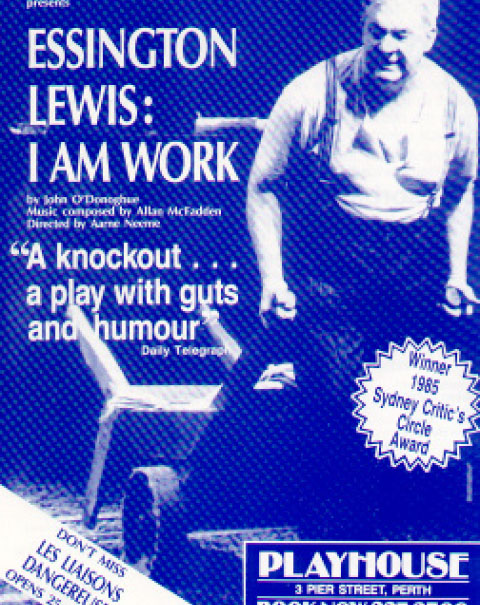
There is no doubt that Lewis was a workaholic. He endured social occasions when he had to but never drank and seldom ate at them. He planned holidays he took like work missions, and took few of them. Idle at home, that he could not endure and went to the office, usually counting the steps as he walked. He had no outside interest and no small-talk. It was engineering or nothing.
The memory of that play left me with the ambition to read or see it, and when that failed, I looked for a biography and found this one. I hesitated for a time, in my precious way. Blainey became a pontificator in the latter 1980s for a vestigial White Australia, though no doubt he would thunder at such a crude characterisation. Indeed he did a lot of thundering into the 1990s against all the changes occurring around him. Me, I just grumble and get on with it.
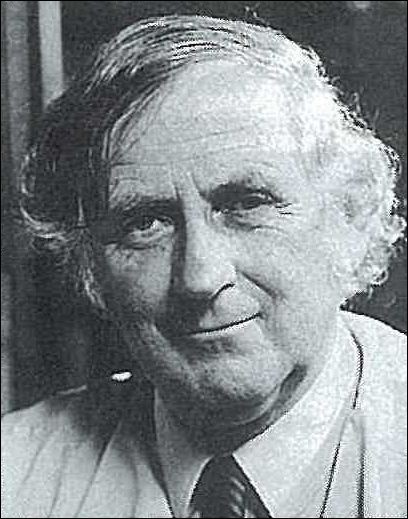 Geoffrey Blainey
Geoffrey Blainey
I had no wish to dine at his intellectual table, but lacking alternatives, I overcame my churlishness. After all, it was my loss not to read the book, not his. The book is well written and impressively researched, though I found it did not have narrative drive. Reading it was uphill, but I put this down to Essington Lewis, who was a pre-eminent drone, and not to any failure on Blainey’s part. Too bad that.
‘Orde Wingate: A Man of Genius, 1903-1944’ (2014) by Trevor Royle.
File this under leadership. Amazon’s Mechanical Turk suggested this title to me and I downloaded it onto the Kindle. I had a vague recollection of the name Wingate from Burma in World War II and before that Palestine. Emphasis on the vague. There in those places he was a solider, but who he was and how he came to be there and what he did there, these were unknown to me.
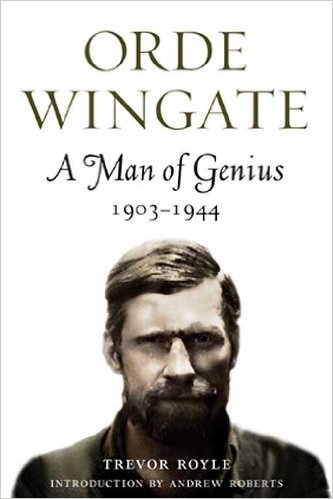
The author’s many careful efforts to make Wingate likeable or admirable fail. Selfish, egotistical, opinionated, volatile, contrary, argumentative, self-absorbed, vain, destructive, delusional, contradictory, and arrogant, these things he was. Genius? Well, how would a mere mortal know?
While his family had money, most of it was given away to charities converting heathen Africans to Christianity. His parents were fervent Christians who preferred prayer to coal fires in winter, prayers to doctors, Bible reading to schools, and waited every day for the second coming of the Saviour.
Because the devil is devious, his father occasionally beat his oldest son, Orde, as a preventative measure. One of Orde’s sisters wrote an angry and bitter memoir of their childhood in which she describes wearing all the clothes there were and watching the fingers turn blue in the cold. The food, well there was some, but words failed her when she tried to describe it.
The Wingate children were kept at home mostly to prevent sinful contact with corrupt beings, that is, other children, while waiting for the second coming. It goes on like that. It is no wonder he became such a nutter. The wonder is that anyone could put up with him. Well, in fact, few did.
The one allowance his parents did make at home was servants, and Wingate led the rest of life on the assumption that there were nameless servants following behind him to clear up the messes he left. These were many. Some well beyond the pay grade of a domestic service.
His father had been in the army (while waiting for the second coming) and as the oldest son Orde followed in those footsteps.
In anticipation of the second coming, at first the young Orde did not apply himself, but in time he did so. The author is unsure what the catalyst was, except perhaps to prove himself to his father. He studied to gain entry to the artillery, and got it, largely thanks to the intercession of an uncle with influence on the General Staff. Many other intercessions followed in his career, as he lurched from one mess to another, usually of his own making.
Wingate spent an inordinate amount of time bewailing the establishment and its many failures and corruptions, all the while advancing his career through the influence of that very establishment. The author draws some veils over the trail but it is pretty clear that he made his way thanks to the string-pulling time after time.
There is no doubt that once he gained a sinecure he worked hard at it and when he concentrated he had considerable ability, but these periods of application were few and far between. The point is that others better suited and more willing to work through channels were denied the place(s) he got, while he denounced the very establishment that made him.
He had a self-destructive streak, as many young men do, and his was perhaps redoubled by that prospect of the second coming, and he blithely extended his risk-taking to the men under his command. He served in the Sudan in the 1920s, and led patrols against various tribes, whom the author invariably describes as rebels. Hmm. It is their home and the Brits were the invaders.
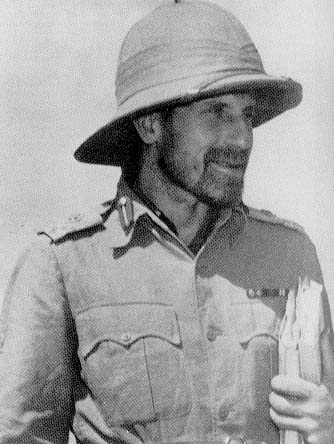 Orde Wingate
Orde Wingate
Further wangling by relatives got him posted to Palestine the 1930s where he became an anti-Lawrence of Arabia. Though a serving British intelligence officer, he became more Zionist than the most ardent Zionist. Another volte-face, and again the author cannot quite pin down the trigger. I suggest it was another one of his delusions of grandeur. Gideon come to liberate Zion.
He was a good intelligence officer. A quick study, he learned Arabic and then Hebrew, and set up the routine translation of Arabic and Hebrew newspapers, pamphlets, lists, and registers that served the British well in the Middle East.
He also betrayed the trust of his position by passing much of the intelligence he saw along to Zionist and Jewish interests. This is reminiscent of the flippant betrayals of Kim Philby, who never gave treason a second thought. Neither did Wingate. Neither counted the bodies because of their treason. When Wingate’s treason became known, it was hushed up on the grounds that to reveal it would be bad publicity. He prospered where another officer would have been courtmartialed and cashiered. This is a recurrent theme in his career. A giant debacle is covered up and he is promoted. Wingate learns that he can do no wrong, and continues in the same vein. (The author does not use the term ‘treason’ nor compare him to Philby. That is my work.)
He got away with behaviour that few others would do, let alone survive, and he thereafter prospered. He struck enlisted men more than once, and was not even reprimanded for it. Indeed he got away with so much that the rumour spread, and became self-fulling, that he had a powerful protector in the hierarchy. He then got away with even more childish behaviour that is all too tiresome to review. It is a reminder of the frequent inability of organisations to handle unsocialized miscreants, like the villains who embezzle millions from banks or the doctors who experiment on patients in hospitals.
His early efforts at combat were disastrous for those under his command. Though the author skirts around it, this reader concluded that Wingate had no grasp of small arms tactics and managed to get his men into a cross-fire of his own making. Rather than be reprimanded, he got a medal for that action, and four dead. That’s the pattern.
He did learn from the cross-fire, and later stressed infantry tactics, something the author seems to think is a sign of his genius. After leading his men into a self-made trap, he then read the field manual. Genius that.
Again despite the author’s delicacy, it is also pretty clear that Wingate’s raids on ‘Arab rebels and gangs,’ as the text styles them involved murdering women and child, preferably in their sleep. These crimes the author puts down to his enthusiasm. ‘Crimes’ is my word, not the author’s.
His personal life was as chaotic, reckless, and destructive as his professional life. He wooed a young woman who waited patiently for him for six years (biological clock ticking) while he was promoted in the Sudan, and then he jilted her without a backward glance.
He threw her over because at thirty-one he had fallen in love with a fourteen year old girl. You read that right. I skipped through a lot of this quickly and I may have the ages slightly wrong but he was twice her age and she was underage. More waiting, and eventual marriage.
Throughout these campaigns he carried a Bible at all times and often referred to himself as Gideon. He meant that literally.
During World War II in Somaliland and Ethiopia against the Italians and Burma against the Japanese it was more of the same on an ever larger scale. By the time of his death he was a major-general, hard though that is to believe. In Burma he concocted wild schemes that got a lot of men killed to little strategic purpose, as far as I could see, despite the author’s efforts to dress it all up. On this point more below.
He also got himself killed. Fitting in a way, though as usual he took others with him. He was flying around inspecting the units that had the misfortune to be under his command, scattered through the jungles of northern Burma. The aircraft was proving to be difficult and the pilot discussed it with ground crews at several of the places they visited. But the pilot did not venture to tell Wingate the timetable must be delayed while the plane is fixed or replaced. Instead the pilot pressed on and the plane crashed. He did not dare tell Wingate whose volcanic temper was widely known.
Toward the end the author suggests as evidence of Wingate’s genius this comparison. It refers to his efforts in Burma to get behind the Japanese. Here is the comparison: Imagine, if a fortnight after the Allies’ Normandy landings, the Germans had inserted by gliders two divisions in Kent between London and south coast to block traffic, create a political crises, and deflate morale.
It is a striking image and it gave me pause. Briefly. Of course there is no comparison of Kent with the jungles of northern Burma, but more important, dropping two divisions of troops into the middle of nowhere was hardly a strategic move. Had the Germans done that, Dwight Eisenhower would have been unable to believe his luck. I say this with confidence, because Ike recognised from the start that the German offensive at the Bulge was crazy. True, it would do a lot of damage but not accomplish anything, because there was no strategic objective. Nor was there one in northern Burma.
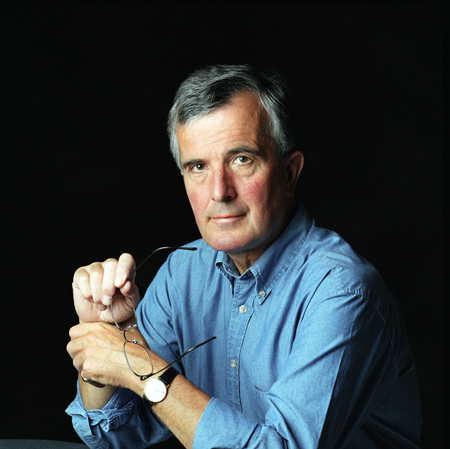 Trevor Royle
Trevor Royle
I read it on the Kindle. The book is well written and to the point. My complaints are about Wingate, not the book. In fact, the book is very well judged, and while the author is clearly trying to rehabilitate Wingate against his many detractors, he provides plenty of information to allow a reader to decide, and I did. Put me in the detractor’s camp.
‘Forty Days without Shadow’ (2014) by Olivier Truc
This is an Arctic krimi set in Sápmi in the far north where Finland, Sweden, and Norway converge along with Russia.
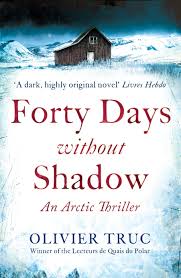
Once this area was called Lappland after its inhabitants, Lapps. It is bounded by the Barents Sea, White Sea, and Norwegian Sea. The land border is not so clear.

In winter there are forty days without sun, and this novel opens just as the sun is about to show itself again, starting with a scant glimpse of six degrees over the horizon, like a 10-watt light in the back of a freezer hidden behind something. Just the top arc shows. But when it reappears after forty days, everyone stops to watch for it.
The Sami are nomadic herders who follow and live off reindeer, borders mean nothing to either the reindeer or the Sami. The Reindeer Police Administration is, according to this novel, a response to this situation. It has multi-national jurisdiction in the Sami areas of Finland, Sweden, and Norway, but not Russia.
Our protagonists are Reindeer Police Patrol 9, consisting of a senior officer, Klemet, who is Sami and who seems to have a Swedish birth certificate, and a younger Norwegian woman, Nina. They ride around on snowmobiles keeping an eye on the herds and the herders to prevent disputes among the herders and between them and other locals, though there are few of these. Klemet broods a lot.

A very exotic location with lots about the place, the weather, the aurora borealis, different kinds of ice, the past, the tensions, including some left over from the Cold War with the biggest home to Sami, Russia.
A pathetic Sami reindeer herder is murdered and at the same time a Sami artefact at a local museum is stolen. Are the two events connected. and if so how? Some of the locals think the only good Sami is a dead one, and say so. Moreover, the local police have little interest in Reindeer Police Patrol 9. Nor do the real Norwegians, real Swedes, or real Finns care about the murder of a Sami alcoholic out on the tundra, nor about any useless artefact, viewing the Sami as a nuisance or hinderance.
But in the course of sorting out the aftermath concerning the victim’s reindeer our protagonists see connections between the murder and the theft. The plot is clever and the place is compelling. Klemet is rather too self-absorbed for me, but he does snap out of it occasionally. The most arresting character is the firecracker who is head of the Nordic Geological Institute who becomes involved. The most formidable is the Sami herder Aslak who lives the old way and seems almost to be a part of land itself. The author distinguishes effectively amongst quite a cast of characters.
I liked the way the Sami culture plays into the mystery with the artefact but also in other ways. Klemet’s uncle with his girlfriend prove what a small world it is.
I wondered about language barriers. Kelmet speaks Swedish. Nina is Norwegian. According to Wikipedia the Sami peoples have many languages. The locals are mostly Norwegians, but there are some Finns and even a Russian or two.
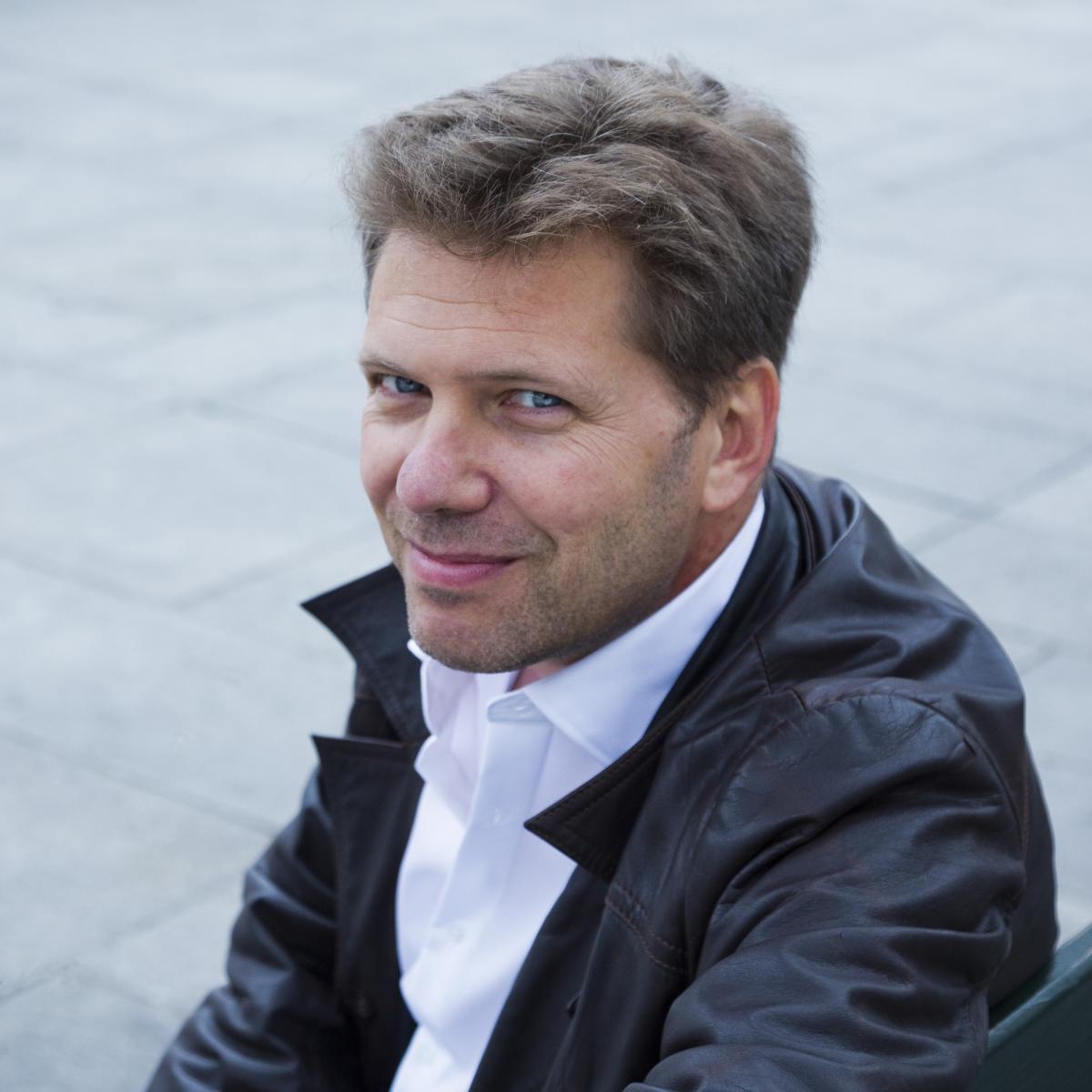 Olivier Truc
Olivier Truc
It is translated from French, which surprised me given the intensity and variety of local knowledge on display I had assumed the author would be of that place and write in one of the languages of that place.
